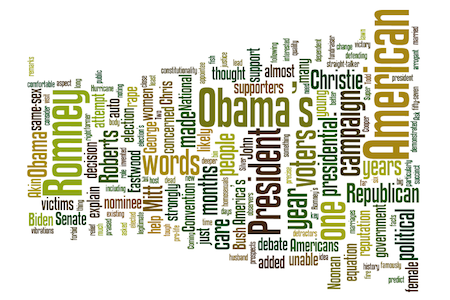The Words That Mattered In 2012

Credit: HNN staff.
Like most other presidential election years, 2012 was strongly influenced by the long campaign for the nation’s highest office. When Americans recall the year almost past, we will likely do so by recalling and examining its words, particularly the following ten quotations that shaped and explain this year in American history.
“It’s halftime in America” -- Clint Eastwood
Over six months before Eastwood made headlines by rambling at an empty chair in prime time at the Republican National Convention, the actor/director was at the center of controversy for his message in a two-minute Super Bowl commercial for Chrysler. The ad, which lauded the resilience and high quality of American auto manufacturing, was a Rorschach test for Americans. President Obama’s supporters loved its implied equation that the auto industry was on its deathbed, the president made the tough decision to help it out, and now it was more than back on its feet. Obama’s detractors feared the same equation.
“The fact is, I’m gay…” -- Anderson Cooper
The most remarkable aspect of the coming-out of one of America’s most popular news anchors was how unremarkable it was. Coming just one year after the dismantling of the military’s “Don’t Ask, Don’t Tell” policy and months before voters in Maine, Maryland, and Washington approved marriage for same-sex couples while voters in Minnesota rejected a ban on same-sex marriages, Cooper’s words reflected the continuing sea change in American views of homosexuals in society.
“… it is not our role to forbid it, or to pass upon its wisdom or fairness.” -- John Roberts
Many close observers of the Supreme Court expected a 5-4 decision in its ruling on the constitutionality of President Obama’s signature health care legislation, the Affordable Care Act. Most believed it would be struck down and almost no one thought the decisive fifth vote upholding the law would come from consistently conservative George W. Bush appointee, Chief Justice John Roberts. For Roberts -- only seven years into his tenure as chief justice and a relatively young fifty-seven years of age -- it was just one of what will likely be many key quotes to have a profound impact on American life.
“… 47 percent of the people … who are dependent upon government, who believe that they are victims ...” -- Mitt Romney
The Republican nominee for the presidency said several things that made his supporters cringe, including “I like being able to fire people,” “self-deportation,” and “I’m not concerned about the very poor.” But no quote damaged Romney’s prospects more than his secretly recorded remarks at a closed fundraiser in which he said nearly half of American voters thought of themselves as “victims” whom he would be unable to convince should “take personal responsibility and care for their lives.”
“… you didn't build that.” -- Barack Obama
President Obama’s attempt to explain how small businesses are built through the efforts of many individuals along the way with the support of public institutions was awkward at best and arrogant at worst. It became the Republicans’ favorite line of attack in their portrayal of Obama as a booster of big government and opponent of self-sufficiency.
“Osama bin Laden is dead and General Motors is alive!” -- Joe Biden
The Obama campaign trotted out the generic and forgettable “Forward” as its campaign motto, but this succinct, powerful, and frequently repeated statement was far better and more meaningful. Biden added to an impressive year for a guy with a reputation as a gaffe machine with his largely praised debate performance, which was critically important for Obama’s reelection in the wake of the president’s limp first debate.
“…legitimate rape…” -- Todd Akin
The GOP’s nominee for Senate in Missouri gave away what appeared to be a sure win when he added this term to the American lexicon. Explaining why raped women did not need to consider abortion, Akin dug deeper by adding, “the female body has ways to try to shut that whole thing down.” A few months later, Indiana Senate candidate Richard Mourdock similarly blew a comfortable lead, defending his strongly pro-life position by noting that pregnancies that resulted from rape were “something that God intended to happen.”
“I love you, women!” -- Ann Romney
Not since President George H.W. Bush said, “Message: I care” in 1992 has there been a more transparent attempt to convey empathy and concern in a presidential campaign as this one from the woman who hoped to become America’s new First Lady. But despite her anecdotes of eating tuna fish sandwiches with Mitt as a young married couple and just-us-gals appeal, Mrs. Romney was unable to keep her husband from suffering a near-landslide 55-44 point loss among female voters.
“I have no idea, nor am I the least bit concerned or interested.” -- Chris Christie
After Hurricane Sandy pounded much of New Jersey, that state’s governor, early Romney supporter, and Republican National Convention keynote speaker Chris Christie was ripped for praising President Obama’s support in coordinating the federal relief effort. Focused on working to help the people of the state he was elected to serve, Christie stayed true to his reputation as a straight-talker with these words, directed at a Fox News host who asked him if he knew whether Mitt Romney had plans to visit the devastation.
“The vibrations are right.” -- Peggy Noonan
Two days before the election, Noonan -- a captain of the American political punditocracy and former presidential speechwriter -- demonstrated the perils of existing within an invented political reality. Citing enthusiasm at rallies and ubiquity of lawn signs in pointing to a Romney victory, she dismissed and subtly mocked the work of leading political statisticians, most famously Nate Silver, who aggregated polling data to predict the election’s outcome with stunningly precise accuracy. Like others in 2012, she learned that, as with words, facts matter.
